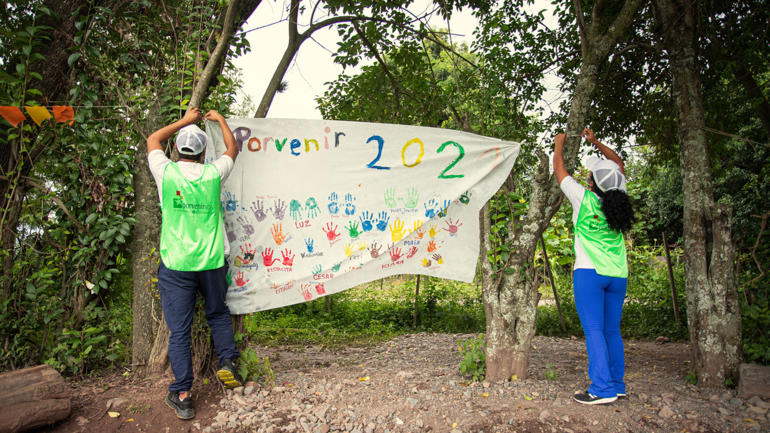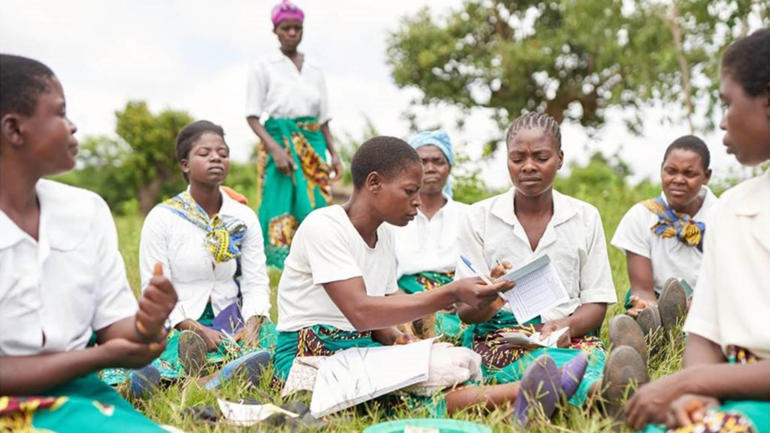This is one of a series of case studies developed by WBCSD and the Just Rural Transition to examine how large agribusinesses empower and engage SME suppliers and stakeholders to reach their sustainability goals. These examine the business case for supplier empowerment; what good policy looks like; and challenges and solutions involved in engaging suppliers. The cases identify best practices around how procurement can support a company’s sustainability priorities and performance. Click here for a synthesis that identifies key themes and recommended action from the series of case studies.
--
Philip Morris International (PMI) has recognized human rights and child labor risks in its supply chain – in some of its sourcing regions such social challenges are endemic. Recognizing that women are agents of positive change in agricultural communities, to tackle these the company has targeted the empowerment of women suppliers and workers through focused training, human rights impact assessments, providing female health care, and encouraging the creation of women-led microfinance savings associations.
Background and business case context
Supply continuity – sustainable smallholder farmer suppliers
PMI is a leading international tobacco company working to deliver a smoke-free future by focusing its resources on developing, scientifically substantiating, and commercializing to adults innovative smoke-free products, with the goal of completely replacing cigarettes as soon as possible.
PMI sources tobacco in many regions of the world, including low- and middle-income countries, where it is typically grown on smallholder farms of less than two hectares. As in many agricultural supply chains, PMI faces some specific sustainability and human rights challenges. One such challenge concerns the role of women, who participate in agriculture both as members of farming households and as hired wage labour. PMI recognizes this important role and considers women as agents of change on farms and in their communities.
Challenge: gender empowerment
Target gender inequalities, boost income and tackle child labor
Agriculture suffers from deeply rooted gender inequalities. Women face structural and cultural barriers including being prejudiced against in terms of ownership of land and property, lower pay, lack of access to finance and credit, and technical support.
Empowering women in rural smallholder farming communities is also directly linked to reducing child labor. Studies show that women are more open than men to learning about child well-being and taking action to ensure their safety. Women are also more likely to reinvest their income in their families and communities, particularly for long-term investments in education and health issues.
Solution
2025 goals – farmers’ living income and elimination of child labor
PMI’s Agricultural Labor Practices (ALP) program is taking these challenges on by putting the women in its tobacco supply chain at the center of its work to ensure safe and fair working conditions for all.
ALP was introduced in 2011 and strengthened in 2018 including a focus on eliminating child labor and ensuring payment of at least legal minimum wages. PMI’s ultimate goal is to achieve a living income for all contracted farmers and eliminate child labor in its tobacco supply chain by 2025.
Case study: Empowering women in Turkey
Focused training
Farmers’ training has been a key component of the ALP program since its inception. While the training was initially designed to raise awareness with farmers of their rights and obligations while working with PMI or its suppliers, more recently the focus has been on using real-life examples, creative delivery methods, and focusing training on women tobacco workers. The ultimate objective is to influence behavioral change and have positive impact on communities.
In Turkey in 2019, three PMI suppliers worked with a local NGO to introduce training sessions for women tobacco growers to raise awareness about mental and physical impacts of child labor, particularly while children were performing hazardous tasks, and to train participants on the importance of safe working practices.
In total, 53 sessions were delivered in 17 villages, involving over 1,100 women. The participants undertook to implement what they had learned in the subsequent crop cycle. Many of the women stated that it had been the first time they had attended a training session aimed at women and that they were pleased that their contribution to tobacco growing was recognized.
Next step: human rights impact assessment
Further recognizing the need for capacity on human rights issues in its supply chain in Turkey, in 2021 PMI worked on a multistakeholder basis with six Turkish tobacco manufacturers and leaf suppliers to complete a human rights impact assessment of supply chain social conditions. The goal of the assessment was to deepen understanding of human rights and labor risks for smallholder supplier communities – 560 community members in 54 villages were consulted as part of the assessment process.
Child labor and gender inequality were among the five priority areas identified by the assessment. Following this, PMI is actively engaging within the three working groups established – with the other manufacturers and leaf suppliers who participated in the assessment. They are working on the focus areas, sharing best practices and challenges with the rest of the industry, encouraging open dialogue, and further sharing opportunities and insights on how to implement actions on the ground. Collaboration is key to best address common challenges and PMI has worked with the other stakeholders involved in the assessment process to develop industry-wide plans to enhance the wellbeing of tobacco farming communities.
Case study: targeting child labor in Argentina
Porvenir program in tobacco growing regions
ALP in Argentina’s focus on child labor and women empowerment is implemented via the Porvenir program, which is delivered in partnership with local NGO Asociación Conciencia in the Misiones, Salta, and Jujuy – regions where PMI sources tobacco from suppliers and growers.
Porvenir aims to prevent child labor, safeguard child health, and provide access to education in tobacco growing communities. It has been implemented in 80 villages, positively impacting more than 2,000 children. The program provides children and young people with educational, recreational and sporting facilities, enabling them to learn and play away from family or other commercial farms. At harvest time there is a particular focus on provision of attention, recreation and food for children and young people living on tobacco farms.
Health checks for women
Women farmers and agricultural workers have suffered from a lack of access to healthcare. The Porvenir program enables access for PMI suppliers’ workers to local health professionals who provide gynecological checkups and treatment. This is also a program about nutritional assistance, with nutritional workshops to support these women’s families’ health and wellbeing.
This is part of PMI’s goal to reinforce the role women farmers have in their community, and help them achieve economic independence, directly impacting their children while, at the same time, helping their businesses become more sustainable.
Case study: Financial empowerment for women – in Malawi and India
Microfinance in Malawi
PMI has also been encouraging entrepreneurial activity for women involved in tobacco farming through the creation of village savings and loans associations (VSLAs), whereby groups of women save money together and are then able to take out small loans from these savings. In many growing regions, communities don’t have access to formal financial services.
VSLAs have been rolled out in Malawi since 2015 and over 4,300 women have participated. Malawi has been a priority country for PMI as child labor is a systemic issue. For this reason, before participating in the VSLAs women must agree to a no-child-labor pledge and are encouraged to enact positive change.
Local savings groups in India
In India, PMI has been working since 2020 to empower women through a program of capability and livelihood training alongside funding for start-up businesses for an additional farm income beside tobacco. After two years of implementation, 400 women have been trained in 43 self-help groups and 200 of them have received capital for their own business.
Based on an initial monitoring conducted on 100 women who established their business in 2020, results show that these women’s monthly income has increased, on average, by 45%, up to $116 per woman. In addition to such income increase, the monitored women were able to fund 64 additional women within the same self-help group to also start their own businesses.
Conclusion
Women are the agents of change in their communities. PMI’s ALP program empowers women to play an active role in boosting their family incomes through long-term solutions, while also enhancing community well-being and addressing social issues.
PMI will take the lessons learned to scale those that are effective, improve those that are less impactful and pilot innovative approaches and projects to overcome barriers.


